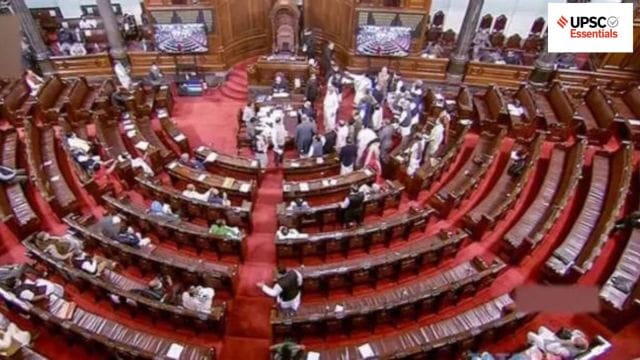
QUESTION 1
With references to the maritime disputes in India, consider the following statements:
1. Admiralty suits cannot be filed for maritime claims for damage to ships.
2. The Admiralty (Jurisdiction and Settlement of Maritime Claims) Act, 2017 governs maritime disputes in India.
3. Admiralty suits can be filed for maritime claims for ownership and agreement disputes, loss of life, wage issues, and environmental damage.
How many of the statements given above are correct?
(a) Only one
(b) Only two
(c) All three
(d) None
Explanation
— The Kerala High Court has ordered the conditional “arrest” of the Liberian container ship MSC Akiteta II, which is now anchored at Thiruvananthapuram’s Vizhinjam port, over compensation claims emanating from the sinking of the MSC Elsa III in May.
Story continues below this ad
— The order came after the Kerala government filed an admiralty suit — a legal proceeding involving maritime law and conflicts — with the High Court. The claim was filed against the Mediterranean Shipping Company, one of the organisations that operates and administers the MSC Akiteta II. MSC Elsa III was operated by another business within the same group.
— The Admiralty (Jurisdiction and Settlement of Maritime Claims) Act, 2017 governs maritime disputes in India. Under the Act, admiralty suits can be filed for maritime claims such as damage to ships, ownership and agreement disputes, loss of life, wage issues, and environmental damage. Hence, statement 1 is not correct and statements 2 and 3 are correct.
— The 2017 law replaced the colonial-era Admiralty Court Act, 1861, and Colonial Courts of Admiralty Act, 1890.
— The jurisdiction of the courts extends up to the territorial waters of their respective jurisdictions. The limit of territorial waters is up to 12 nautical miles from the nearest point of a low-water line along the coast. This also includes the seabed, subsoil (the layer of soil under the topsoil on the surface), and airspace above it.
Therefore, option (b) is the correct answer.
QUESTION 2
Consider the following statements:
Story continues below this ad
Statement 1: The Parliament cannot legislate on a matter placed in the State List in normal circumstances.
Statement 2: If Rajya Sabha passes a resolution by a majority of not less than two-thirds of members present and voting, then Parliament becomes empowered to make a law on the subject.
Which one of the following is correct in respect of the above statements?
(a) Both Statement 1 and Statement 2 are correct and Statement 2 is the correct explanation for Statement 1.
Story continues below this ad
(b) Both Statement 1 and Statement 2 are correct and Statement 2 is not the correct explanation for Statement 1.
(c) Statement 1 is correct but Statement 2 is incorrect.
(d) Statement 1 is incorrect but Statement 2 is correct.
Explanation
— The Council of States (Rajya Sabha), has its own distinctive features. Rajya Sabha being a federal chamber enjoys certain special powers under the Constitution. All the subjects/areas regarding legislation have been divided into three Lists – Union List, State List and Concurrent List. Union and State Lists are mutually exclusive.
— Under normal circumstances, Parliament cannot legislate on an issue that has been placed on the State List. However, if the Rajya Sabha passes a resolution by a majority of at least two-thirds of the members present and voting that it is “necessary or expedient in the national interest” for Parliament to make a law on a matter enumerated in the State List, Parliament is empowered to make a law on the subject specified in the resolution for the entire or any part of India’s territory. Hence, statements 1 and 2 are correct.
— Such a resolution remains in force for a maximum period of one year but this period can be extended by one year at a time by passing a similar resolution further.
Story continues below this ad
Both Statement 1 and Statement 2 are correct and Statement 2 is not the correct explanation for Statement 1.
Therefore, option (a) is the correct answer.
(Source: sansad.in)
QUESTION 3
With reference to the nominated members of the Rajya Sabha, consider the following statements:
1. The members to be nominated by the President to Rajya Sabha shall consist of persons having special knowledge or practical experience in Literature, science, art and social service.
2. A nominated member has to join a political party within two months of taking his/ her seat in the House.
Story continues below this ad
3. They do not have the right to vote in the election of the Vice-President.
Which of the statements given above is/are correct?
(a) 1 and 2 only
(b) 1, 2 and 3
(c) 1 only
(d) 2 only
Explanation
— Just over a year since his Lok Sabha election loss from the Mumbai North Central seat, prosecutor Ujjwal Nikam has been nominated to the Rajya Sabha by President Droupadi Murmu.
Nominated members to the Rajya Sabha
— The President will nominate members who have unique expertise or practical experience in the following areas: literature, science, art, and social service. Hence, statement 1 is correct.
— Nominated members can join a political party within six months of obtaining their position in the House, and they have the same powers and privileges as elected Members of Parliament. They can take part in the proceedings of the House in the normal manner. Hence, statement 2 is not correct.
Story continues below this ad
— Nominated members are not permitted to vote in the election of the President. However, they have the right to vote in the Vice-Presidential election. Hence, statement 3 is not correct.
Therefore, option (c) is the correct answer.
To read more: Knowledge Nugget | How and why members are nominated to Rajya Sabha – A must-know for UPSC aspirants
QUESTION 4
Which of the following is/are the benefits for the registered political parties?
1. They can get recognition as a State Party or National Party subject to the fulfillment of the conditions prescribed by the Commission.
Story continues below this ad
2. If a party is recognised as a `National Party’ it is entitled for exclusive allotment of its reserved symbol to the candidates set up by it throughout India.
3. State and National parties are entitled to two sets of electoral rolls free of cost and broadcast/telecast facilities over Akashvani/Doordarshan during general elections.
How many of the statements given above are correct?
(a) Only one
(b) Only two
(c) All three
(d) None
Explanation
— While refusing to entertain an appeal which sought cancellation of the registration of All India Majlis-e-Ittehadul Muslimeen (AIMIM) as a political party for allegedly promoting only Muslim interests, the Supreme Court permitted the petitioner to file a fresh petition raising larger issues of political parties advancing not just communal, but even casteist or regional interests, terming it “equally dangerous”.
— The candidates set up by a political party registered with the Election Commission of India will get preference in the matter of allotment of free symbols vis-Ã -vis purely independent candidates. Further, registered political parties, in course of time, can get recognition as `State Party’ or National Party’ subject to the fulfillment of the conditions prescribed by the Commission in the Election Symbols (Reservation and Allotment) Order, 1968, as amended from time to time. Hence, statement 1 is correct.
— If a party is recognised as a “State Party,” it is entitled to the exclusive allotment of its reserved symbol to the candidates set up by it in the State of States in which it is so recognised, and if a party is recognised as a “National Party,” it is entitled to the exclusive allotment of its reserved symbol to the candidates set up by it across India. Hence, statement 2 is correct.
— Recognised ‘State’ and ‘National’ parties require only one proposer to file a nomination and are entitled to two sets of electoral rolls at no expense, as well as broadcast/telecast privileges over Akashvani/Doordarshan during general elections. Hence, statement 3 is correct.
Therefore, option (c) is the correct answer.
(Other Source: http://www.eci.gov.in)
QUESTION 5
Consider the following:
A Money Bill passed annually (or at various times of the year) providing for the withdrawal or appropriation from and out of the Consolidated Fund of India, of moneys, voted by Lok Sabha and moneys charged on the Consolidated Fund for the services of a financial year or a part of a financial year.
The above-mentioned lines refer to:
(a) Repealing and Amending Bill
(b) Finance Bill Category II
(c) Private Member’s Bill
(d) Appropriation Bill
Explanation
— An Appropriation Bill is a Money Bill passed annually (or at various times of the year) providing for the withdrawal or appropriation from and out of the Consolidated Fund of India, of moneys, voted by Lok Sabha and moneys charged on the Consolidated Fund for the services of a financial year or a part of a financial year.
Therefore, option (d) is the correct answer.
(Source: sansad.in)
QUESTION 6
Consider the following:
1. MPs of both Houses of Parliament
2. MLAs of the states and Delhi and Puducherry
3. Nominated members of Rajya Sabha, Lok Sabha and the Assemblies
4. Members of state Legislative Councils
Which of the above are part of the electoral college electing the President of India?
(a) 1 only
(b) 1 and 2 only
(c) 2 and 4 only
(d) 1, 2 , 3 and 4
Explanation
— The President is elected by an electoral college consisting of MPs of both Houses of Parliament and MLAs of the states of Delhi and Puducherry.
— Nominated members of Rajya Sabha, Lok Sabha and the Assemblies, and members of state Legislative Councils, are not part of the electoral college.
Therefore, option (b) is the correct answer.
QUESTION 7
With reference to Zonal Councils, which of the following statements is/are true?
(a) Prime Minister chairs; Chief Minister of the largest state is vice‑chairman
(b) President chairs; rotating vice‑chairman is governor of a member state
(c) Union Home Minister chairs; Chief Ministers rotate as vice‑chairmen annually
(d) Chief Justice chairs; nominated vice‑chairman is any state minister
Explanation
— The Union Home Minister chairs the Council; the Chief Ministers of member states rotate annually as vice‑chairman.
Therefore, option (c) is the correct answer.
QUESTION 8
Which Article in the Constitution of India empowers the Election Commission of India (ECI) to supervise and control the preparation of electoral rolls?
(a) Article 326
(b) Article 327
(c) Article 324
(d) Article 329B
Explanation
— Article 324 vests the ECI with overall power of “superintendence, direction and control” over elections and electoral roll preparation.
Therefore, option (c) is the correct answer.
Previous Daily Subject-Wise-Quiz
Daily Subject-wise quiz — History, Culture, and Social Issues (Week 117)
Daily subject-wise quiz — Polity and Governance (Week 118)
Daily subject-wise quiz — Science and Technology (Week 118)
Daily subject-wise quiz — Economy (Week 118)
Daily subject-wise quiz — Environment and Geography (Week 118)
Daily subject-wise quiz – International Relations (Week 118)
Subscribe to our UPSC newsletter and stay updated with the news cues from the past week.
Stay updated with the latest UPSC articles by joining our Telegram channel – IndianExpress UPSC Hub, and follow us on Instagram and X.


































